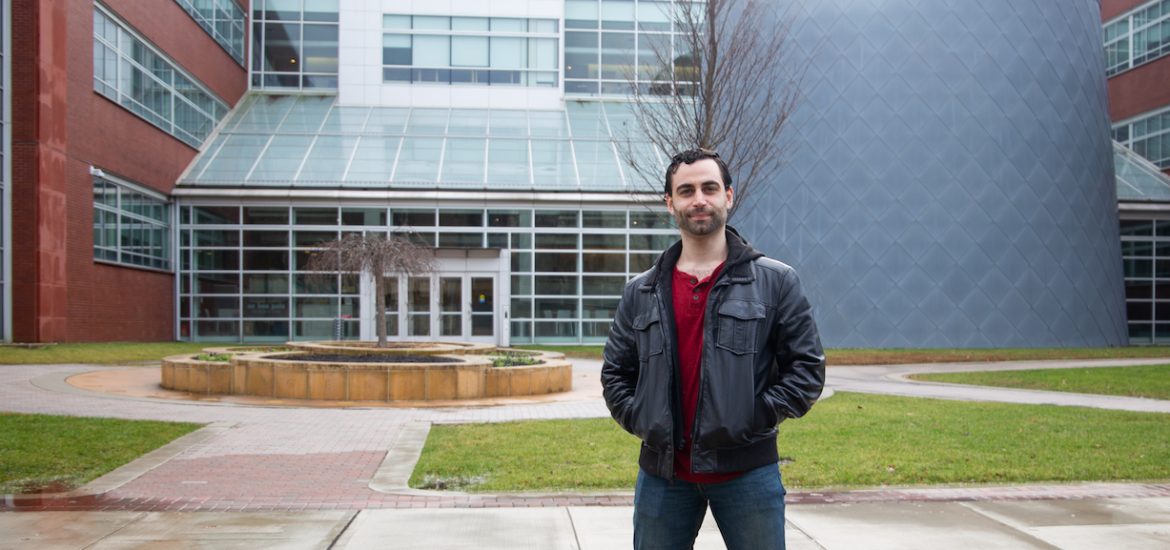Today, we speak with Dave Berg, clinical mental health counseling graduate student from Wenonah, NJ (Gloucester County). Dave will share his #PROFspective with us on what it’s like to be a Rowan University graduate student and how he’s getting the most out of his college experience as a Rowan Prof.
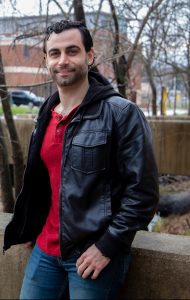
Name: Dave Berg
Major: Clinical Mental Health Counseling
Year: 2nd year graduate
Transfer Student: Yes, from Gloucester County College (Now RCGC)
Hometown and County: Wenonah, NJ (Gloucester County)
Commuter: Yes
Do you work on campus? Yes, I am a test proctor in Testing Services
Do you have an off-campus job? Yes, I intern at the Joseph J. Peters Institute for my practicum (a year-long internship as a mental health counselor)
Why did you choose your major? I have been friends with a handful of people struggling with mental health problems from depression to autism. Their struggles opened my eyes to a world of hurt. I have always been a caring and empathic person, so I knew I could play a part in healing other people’s pain.
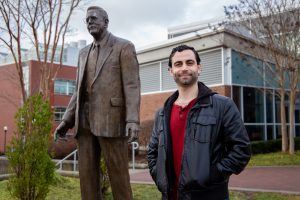 One reason why you chose Rowan? Rowan is nearby, connected to the community college I was attending, and I knew people who went to the school and enjoyed being on and near campus with them.
One reason why you chose Rowan? Rowan is nearby, connected to the community college I was attending, and I knew people who went to the school and enjoyed being on and near campus with them.
Share an “a ha!” moment you’ve had within your major that made you feel passionate about your intended field.
I was in a cognitive psychology class learning about the theories of memory and felt a rush of excitement in my chest. I loved learning about the ways people believe the mind works and what that means for my everyday life, progress in society, and how it could be applied to helping others. This came as a second and final moment for me in which I knew I found my passion. The first moment that fueled my interest occurred at Gloucester County College in an essentials of psychology (psych 101) course. My first college psychology professor, a jazz drummer by hobby who sported a large beard, told us a story while standing barefoot at the front of the class. He was working with at-risk youth, who are commonly called “juvenile delinquents”, and invited a couple of them to paint his house. He had to go out, so he gave them directions and left their pay on the table. He said that many people would have expected them to just steal the money and leave, but they stuck to the directions, did a great job, and took only the money once they had finished. He explained that these teens weren’t “bad”, they were simply not given any trust by adults, something that they strongly desired. They acted honestly and productively when they were given what they needed: trust. I then wanted to be a counselor who could affect people’s lives for the better just like he had.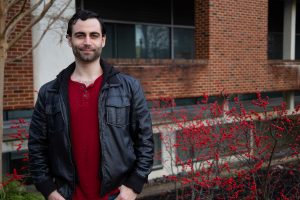
Describe for us an experience you’ve shared with a professor in which you felt like you were working with a visionary in your field.
I was in my counseling theory and techniques II class with Dr. David Angelone discussing research methods in the social sciences. I asked him if he ever feels frustrated by the shortcomings and difficulties he faces in the field of psychological research. He said that he doesn’t because he knows that he is one piece of a larger picture. He said that he would be happy and satisfied if he could answer just one question out of all of the questions that are out there because he would know that he did his part to contribute to the collective understanding. This humble attitude of an expert in my field left an impression on me. He taught me that it’s easy to get overwhelmed by the magnitude of the unknown and the antidote is to be happy with the work you are doing while striving to do your part as well as you can.
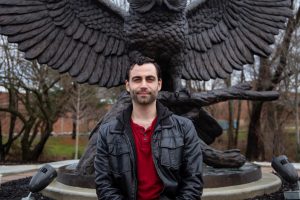 Could you share a moment you’ve experienced in which you have felt that Rowan is a welcoming environment for you?
Could you share a moment you’ve experienced in which you have felt that Rowan is a welcoming environment for you?
Two moments stick out in my mind when I felt really welcome at Rowan. They were both at my undergraduate graduation. The first occurred when I walked across the stage and received my diploma. Professors were standing just off the far side of the stage. I walked down the ramp, and the professor I had for Psychology of Personality, Dr. Thomas Dinzeo, was standing there. He shook my hand and told me he looked forward to teaching me again in the fall. He still takes the time to stop and talk to me when he sees me in the hallways. Another moment occurred later on the day of my graduation when Brenda Harkins, the secretary for the Psychology Department, hugged me and congratulated me. She also always takes the time to say hi and always makes me feel like she is genuinely happy to see me when I enter the psych department.
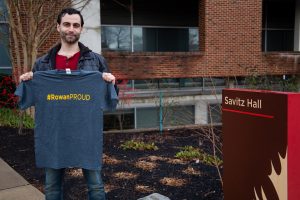 On your busiest day, what academic, non-academic and social responsibilities are you juggling?
On your busiest day, what academic, non-academic and social responsibilities are you juggling?
Graduate school is tough. The material is involved, but my major is not particularly difficult with the proper background (I was a psychology major in undergrad). The challenge is in the sheer volume of work required for a master’s degree. I have done more reading in the past two years than I have in the rest of my life, and I have always been an avid reader. The standards for the assignments are high but attainable; you can’t just save assignments for last-minute and expect to get a good grade, but you can thrive if you put in the work and balance your time appropriately. Add in two jobs and basic responsibilities like finding time to eat and do laundry become a real challenge. It is all very rewarding though and grants a sense of accomplishment like few others things ever have to me. Finding time for friends is also very difficult; I only experience a few spur-of-the-moment activities for the time being. I also have a dog to take care of, but my family has been very helpful with that. I just wish I could see him more. I also have a girlfriend who is also in graduate school, so we can spend time together while doing homework.
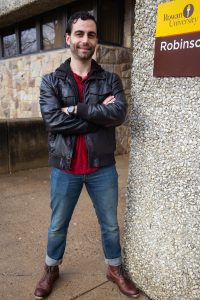
There are other challenges too. Maintaining a healthy work-life balance can be difficult because of the heavy workload and takes dedication to achieve. It requires assertiveness and knowing when to say no to your supervisors when they ask you to stay late, how to decline respectfully and appropriately, and also when to yes. Also, balancing your effort is just as important as balancing your time. There is a lot of work, and some of it is easier than others. You won’t do as well as you could if you put a lot of work into the easy assignment and work on the hard one when you’re tired. The biggest challenge I’ve had to face, however, is finding time for sleep. I’m an 8-9 hour-per-night kind of guy, but nowadays I usually get 6 or less. Learning how to operate at full capacity and do good work while being so sleep deprived was an adjustment but now seems like part of normal life.
My typical day at Rowan.
Most of my work occurs off-campus in my second year of my program. I am interning at the Joseph J. Peters Institute in Philadelphia where I counsel children and adults who have experienced psychological trauma, mostly resulting from sexual violence. While I am on campus, my day is comprised of work during the day and class at night. I work at Testing Services in Savitz Hall where I proctor tests. I administer accommodated exams (e.g., extended time for students with diagnoses of ADHD) and placement tests for incoming students, observe students as they take their tests, serve students in what ways I can, and respond to emails. I head to class after work ends.
On Mondays, I have my Practicum class, which corresponds to my internship. We as mental health counselors are bound by the Health Insurance Portability and Accountability Act (HIPAA), which prevents us by law from sharing information about the clients we serve from anyone outside of their treatment team or our colleagues and supervisors with whom we consult. We as graduate students have an additional exception: we discuss our cases with our practicum coordinator, who is an experienced clinician himself as well as an educator. We use this class time to discuss and present on cases that we currently have and receive guidance on how to better serve the people we treat. After class ends, I go home and do any homework I have left over. I also always make sure to engage in self-care as much as I can to make sure I stay fresh and clear-headed so I can do my job as well as possible.
Like what you see? Come visit us!
Story & photography by: Vanessa Vause, senior public relations, advertising & theatre major

